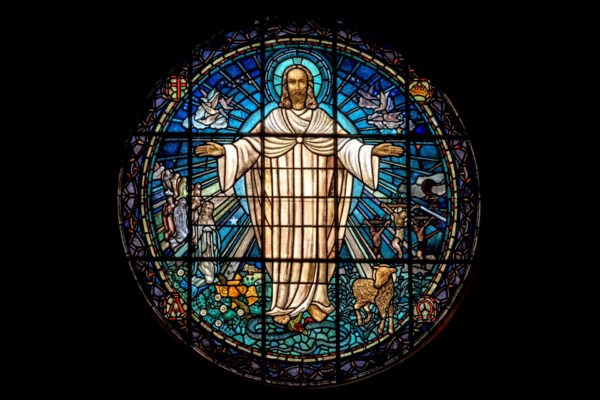This sermon, “Walking in the Light of Immanuel,” was delivered at our 2018 Christmas Candlelight service.
Christmas, the celebration of Jesus our Immanuel, can be illustrated with the imagery of light and darkness. The story of Christ’s birth is the story of how the light of God’s grace appeared to dispel the despair of sin’s dark night. As we often sing, Christmas is all about the incarnation of the Son of God, “love’s pure light,” who appeared “with the dawn of redeeming grace.”
This imagery is actually drawn from Scripture. Isaiah, speaking of the child that would be born and given to us, declared that “the people who walked in darkness have seen a great light; those who dwelt in a land of deep darkness, on them has light shone” (Isa. 9:2). In the prologue to John’s gospel, speaking of Jesus as the eternal Word of God, he writes: “In him was life, and the life was the light of men. The light shines in the darkness, and the darkness has not overcome it” (John 1:4-5). Jesus is the light of the world who came to set free those who sit in darkness and the shadow of death (Luke 1:79). This is the good news of Christmas!
But there’s more to this good news of great joy. If the light of Christ has indeed shone in our hearts, then we no longer belong to the darkness. Instead, by grace through faith, we have become the children of light, children of the day (see 1 Thess. 5:5). And now, the love of God towards us in Christ compels us to cast off the works of darkness, to put on the armor of light, and to “walk properly as in the daytime” (Rom. 13:12-13). As John also wrote: “If we walk in the light, as he is in the light, we have fellowship with one another, and the blood of Jesus his Son cleanses us from all sin” (1 John 1:7). Not only has the darkness of our sin been dispelled by the death and resurrection of the Son of God, we have been liberated to joyfully walk in the light of God’s glorious grace.
But what does this look like? How does the incarnation of Christ change how we live life from day to day? Here are three characteristics which ought to describe those who are walking in the light of Immanuel.
Walk in Humility
Do nothing from selfish ambition or conceit, but in humility count others more significant than yourselves. Let each of you look not only to his own interests, but also to the interests of others. Have this mind among yourselves, which is yours in Christ Jesus, who, though he was in the form of God, did not count equality with God a thing to be grasped, but emptied himself, by taking the form of a servant, being born in the likeness of men. And being found in human form, he humbled himself by becoming obedient to the point of death, even death on a cross (Php. 2:3-8).
In this passage, Paul commands the church to live in light of the humility of Jesus. He is calling them to reflect the unity that they have in Christ, which means putting to death their pride, their self-centeredness, and even their rights for the sake of others. He defines the essence of true humility in verse 3: it’s considering others to be more significant, to be more important, than one’s self. In verse 4, it’s caring about the interests and the well-being of others. Like love, that doesn’t insist on its own way, humility insists on the ways of others.
Then in verse 5, he provides an illustration of the kind of humility to which we have all been called: “Have this mind among yourselves, which is yours in Christ Jesus.” In other words, we are to have the same attitude, the same disposition, the same bearing towards others as Christ did—an attitude which springs forth from the new life we have in him by faith. And what kind of humility did Christ display? He was willing to lay aside his glory, his heavenly position, his exalted status, to take on flesh and “the form of a slave” (2:7). For Paul’s audience, the gap between being in the form of the eternal God and taking on the form of a lowly slave was the absolute greatest distance imaginable, yet Jesus crossed it. But his humility did not stop there. Not only did the Word become flesh, but he humbled himself “be becoming obedient to the point of death, even death on a cross” (2:8).
This is the kind of selfless humility that should characterize the children of light. In Romans 12, Paul writes that Christians should “Outdo one another in showing honor” (Rom. 12:10). The image is one of Christians striving to show more grace and love and honor to others. None of this is to say that we should despise ourselves, consider ourselves of no worth, or that we should boast in our self-pity. Instead, we should simply care about others more than ourselves. It’s being self-forgetful. Tim Keller puts this beautifully. He writes: “The essence of gospel-humility is not thinking more of myself or thinking less of myself, it is thinking of myself less. . . . True gospel-humility means I stop connecting every experience, every conversation, with myself. In fact, I stop thinking about myself” (Keller, The Freedom of Self-Forgetfulness, 32).
Walking in the light of Immanuel means that we should strive to walk in selfless humility.
Walk in Generosity
We want you to know, brothers, about the grace of God that has been given among the churches of Macedonia, for in a severe test of affliction, their abundance of joy and their extreme poverty have overflowed in a wealth of generosity on their part. For they gave according to their means, as I can testify, and beyond their means, of their own accord, begging us earnestly for the favor of taking part in the relief of the saints. . . . But as you excel in everything—in faith, in speech, in knowledge, in all earnestness, and in our love for you—see that you excel in this act of grace also. I say this not as a command, but to prove by the earnestness of others that your love also is genuine. For you know the grace of our Lord Jesus Christ, that though he was rich, yet for your sake he became poor, so that you by his poverty might become rich (2 Cor. 8:1-4, 7-9).
This passage is a profound example of looking to the interests of others at great cost; it’s a stunning picture of gospel generosity. The Macedonian churches, though experiencing a severe trial and extreme poverty, were eager to take part “in the relief of the saints” (8:4) and joyfully gave beyond their means to help the poor Jewish believers in Jerusalem. These are struggling, impoverished, and Gentiles churches that are overflowing “in a wealth of generosity” for their Jewish brothers and sisters!
The Apostle Paul was using their example to encourage the Corinthian churches likewise to excel in this act of grace (8:7). Notice how Paul lovingly challenges them in verse 8 (the NLT is helpful here): “I am not commanding you to do this. But I am testing how genuine your love is by comparing it with the eagerness of the other churches.” In other words, Paul is indicating that the genuineness of their love should be demonstrated in eager, cheerful, and willing generosity. But why? The answer is found in verse 9: “For you know the grace of our Lord Jesus Christ, that though he was rich, yet for your sake he became poor, so that you by his poverty might become rich.” Paul again is using the incarnation of Christ to show believers how they ought to walk as children of the light. Christ Jesus left the glories of heaven to become poor for our sake. He accepted a life of hardship, mistreatment, misunderstanding, and ultimately a horrendous death that we might become receive the inexpressible gift of salvation. He gave his life for us that “by his grace we might become heirs according to the hope of eternal life” (Titus 3:7).
Think of John 3:16, and the great truth that God so loved the world that he gave his only-begotten Son. The God who has saved us and is conforming us into his image is a God overflowing with loving generosity. If we claim to be children of the light, if we profess to be born again, if we call this God our Father, then shouldn’t we bear some family resemblance? Shouldn’t we likewise be a people characterized by loving generosity, even when it costs us dearly?
Walking in the light of Immanuel means that we should strive to walk in loving generosity.
Walk in Purity
Everyone who makes a practice of sinning also practices lawlessness; sin is lawlessness. You know that he appeared in order to take away sins, and in him there is no sin. No one who abides in him keeps on sinning; no one who keeps on sinning has either seen him or known him. Little children, let no one deceive you. Whoever practices righteousness is righteous, as he is righteous. Whoever makes a practice of sinning is of the devil, for the devil has been sinning from the beginning. The reason the Son of God appeared was to destroy the works of the devil. No one born of God makes a practice of sinning, for God’s seed abides in him; and he cannot keep on sinning, because he has been born of God. By this it is evident who are the children of God, and who are the children of the devil: whoever does not practice righteousness is not of God, nor is the one who does not love his brother (1 John 3:4-10).
Not only should we walk in humility and generosity, but as children of light, we ought to walk in purity. We ought to walk in holiness, in joyful obedience, in ever-increasing sanctification. John, in his characteristic style, makes this point abundantly clear in this passage. He has already explained that “God is light, and in him is no darkness at all” (1 John 1:5). He has already explained that we are to walk in the light as he is in the light (1:7). Here, however, he cuts right to the chase. Jesus—who himself has no sin—appeared to take away sins (3:5); he appeared to destroy the works of the devil (3:8). Therefore, how should those who have been born of God live? The shouldn’t make a practice of sinning but should practice righteousness!
Verse 10 is so unbelievably simple in its meaning, but so often do we live as if it this verse is not to be found in God’s holy word: “By this it is evident who are the children of God, and who are the children of the devil: whoever does not practice righteousness is not of God, nor is the one who does not love his brother.” To state it positively, those who are of God—who have been born of God, who are children of the light who walk in the light of Immanuel—practice righteousness and love their brothers (demonstrated in selfless humility and gospel generosity).
Paul also explains this in Titus 2:11-14 when he writes:
The grace of God has appeared, bringing salvation for all people, training us to renounce ungodliness and worldly passions, and to live self-controlled, upright, and godly lives in the present age, waiting for our blessed hope, the appearing of the glory of our great God and Savior Jesus Christ, who gave himself for us to redeem us from all lawlessness and to purify for himself a people for his own possession who are zealous for good works.
As we wait for the second advent of the risen Lord Jesus, his second appearing, we are to walk in gospel purity. This is why John could begin his exhortation in chapter 3 of his letter with this great truth: “Beloved, we are God’s children now, and what we will be has not yet appeared; but we know that when he appears we shall be like him, because we shall see him as he is. And everyone who thus hopes in him purifies himself as he is pure” (1 John 3:2-3).
Walking in the light of Immanuel means that we should strive to walk in gospel purity.
Let Your Light Shine
Jesus is the light of the world, who has come to give us the light of life (John 8:12; Gal. 2:20). Yet as we walk in Immanuel’s light, as the light of his life radiates from his church, we become the light of Christ in this dark world. Jesus explains this in the Sermon on the Mount: “You are the light of the world. A city set on a hill cannot be hidden. Nor do people light a lamp and put it under a basket, but on a stand, and it gives light to all in the house. In the same way, let your light shine before others, so that they may see your good works and give glory to your Father who is in heaven” (Matt. 5:14-16; Php. 2:14-15).
May this be true of each one of us today. Until Christ returns in glory, may this be true of his church in the world. May we strive to walk in the light of Immanuel, that the world might give glory to our God and Savior, who sent his Son into the world for us.




